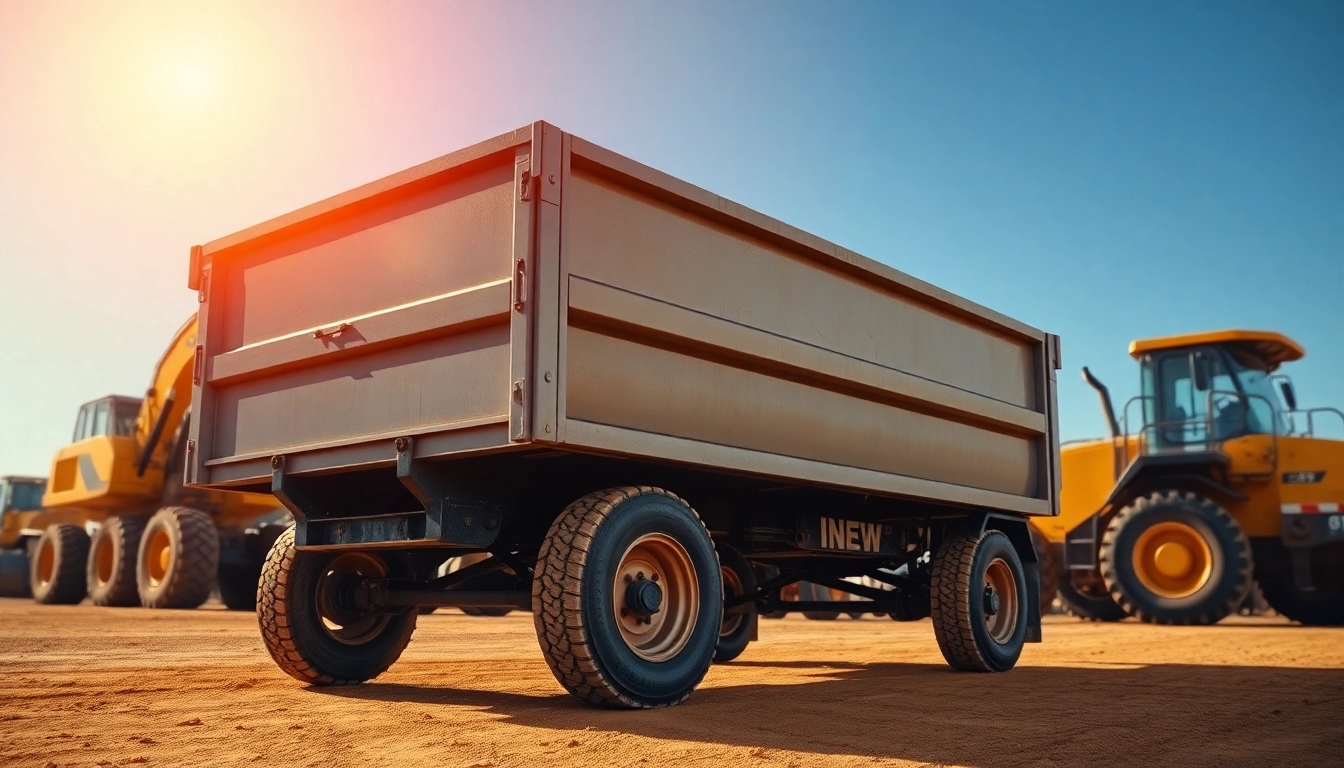Understanding the Value of a Used Dump Trailer
In the realm of hauling and transportation, used dump trailer for sale near me has become a prevalent search among consumers and contractors alike. Their versatility makes them an essential tool for construction, landscaping, and various agricultural applications. This article explores the inherent value of investing in a used dump trailer, diving into its benefits, factors influencing its condition and price, where to find them, and how to maintain them efficiently.
Why Choose a Used Dump Trailer?
Many buyers opt for used dump trailers due to several compelling reasons:
- Cost Efficiency: A significant advantage of purchasing used equipment is the lower price point. New dump trailers can be exorbitantly priced, while used options offer affordability without sacrificing functionality.
- Immediate Availability: New trailers may come with waiting periods due to manufacturer lead times. In contrast, the used market allows for immediate acquisition, enabling users to start their projects without delay.
- Depreciation Benefits: New vehicles lose value quickly the moment they are driven off the lot. When you buy a used dump trailer, the previous owner has absorbed much of that initial depreciation.
- Established Performance: Used trailers often come with a track record. Many sellers will provide detailed histories, showing how the trailer has performed under various conditions.
Assessing the Condition and Value
When contemplating a used dump trailer, thorough assessment is crucial. Key factors impacting the condition and therefore the value include:
- Physical Inspection: Look for rust, corrosion, and signs of structural damage. The trailer’s frame, hinge areas, and dump mechanism are critical points to check for integrity.
- Mileage and Usage: Understanding how much the trailer has been used provides insights into its potential remaining lifespan. A well-maintained trailer with moderate use could be more valuable than an extensively used one, regardless of age.
- Maintenance Records: A seller’s transparency about upkeep can indicate responsible previous ownership and enhance the buyer’s confidence.
- Modifications and Features: Whether the trailer has custom features or modifications can also influence its value. Additional benefits like upgraded axles or hydraulic lifts can increase worth.
Common Features to Look for in a Used Dump Trailer
Identifying necessary features enhances utility and safety. Important features to consider include:
- Dump Mechanism: Ensure the trailer’s hydraulic lift operates smoothly; a malfunctioning lift can significantly downgrade the trailer’s utility.
- Tire Condition: Examine the tires for wear and tear. Replacing tires can add considerable expense if they are not in good condition.
- Braking System: Verify whether the braking system is functional; electric brakes often provide better control than surge brakes.
- Load Capacity: Different trailers have different weight limits. Ensure the trailer meets your requirements for loading capacity.
Where to Find Used Dump Trailers for Sale Near Me
Locating a used dump trailer can be as daunting as ensuring you purchase a quality one. However, various resources can simplify the process:
Local Dealerships and How to Navigate Their Offers
Local dealerships often have inventories of used dump trailers, providing the advantage of in-person inspections. When visiting a dealership:
- Ask About Trade-Ins: Dealerships frequently allow trade-ins that can present unique value propositions.
- Negotiate: Don’t accept the sticker price; dealerships expect haggling. Conduct market research to ensure you’re informed about fair pricing.
- Request a Test Drive: If possible, test the functionality of the dump mechanism during your visit.
Online Marketplaces for Used Dump Trailers
In today’s digital-driven world, online platforms serve as excellent resources for finding used dump trailers. Key marketplaces include:
- Classified Ads: Websites such as Craigslist and Facebook Marketplace list numerous trailers. Filter your search by location to discover nearby options.
- Equipment-Specific Websites: Platforms like Equipment Trader serve as comprehensive resources for browsing used dump trailers, filtering by brand, model, and price.
- Auctions: Online auction sites occasionally host listings for used trailers, sometimes selling at lower prices than traditional markets. Ensure you understand the auction process before participating.
Purchasing from Private Sellers: Pros and Cons
Buying from private sellers can offer distinct advantages and drawbacks:
- Pros:
- Potentially Lower Prices: Private sellers usually do not have the overhead costs of dealerships, resulting in better deals.
- Direct Communication: Negotiating directly with owners can yield flexibility and better insights into the trailer’s history.
- Cons:
- No Warranty: Private sales often come with no guarantee or warranty, meaning buyers assume all risk.
- Fraud Risk: With no reputable dealer backing the sale, it’s essential to perform thorough checks to avoid scams.
Factors Influencing Prices of Used Dump Trailers
Understanding what influences a trailer’s price can empower buyers to make informed decisions. The primary factors include:
Age and Condition of the Trailer
The age and physical state of the trailer are paramount in establishing its price. Generally, newer models in excellent condition command higher prices, while older trailers with signs of wear will be more affordable. Equipment that requires refurbishment may require lower initial investment but could incur higher costs post-purchase.
Brand Reputation and Model Popularity
Brand perception can significantly affect value. Popular brands often retain their worth better than obscure manufacturers because of recognized reliability. Additionally, models with specific features or higher payload capacities could attract increased demand, thus influencing prices.
Market Demand Trends in Your Area
Local market conditions play a crucial role in pricing. In regions with significant construction activity, demand for trailers typically increases, leading to higher prices. Conversely, areas with lower activity may offer better deals. Staying abreast of local trends can set your buying strategies effectively.
Tips for Negotiating the Best Deals on Used Dump Trailers
Successful negotiation can yield better prices, ensuring the buyer maximizes value. Here are essential strategies:
Researching Before You Negotiate
Prior to negotiating, thorough research is vital. Knowledge of average prices for similar trailers in the market strengthens your position. Compile information on the specific make and model, inclusive of its age, features, and how they compare to the trailer at hand.
Understanding Common Seller Tactics
Sellers may utilize various tactics to secure a favorable deal. Common strategies include:
- Price Anchoring: Sellers might set an elevated initial price, anticipating negotiations to lower it to a more palatable figure.
- Scarcity Tricks: Indicating multiple interested parties creates urgency, prompting buyers to act quickly.
Being aware of these tactics allows buyers to prepare counter-arguments, making them less susceptible to pressure.
Offering a Fair Price: What to Consider
Proposing a fair price may initiate negotiations. Factors to consider when making an offer include:
- Market Research: Base your offer on findings conducted during your research. Presenting documented evidence can reinforce your price rationale.
- Condition vs. Asking Price: Ensure that your offer reflects the trailer’s condition, being reasonable yet assertive based on the findings from your assessments.
Maintaining Your Used Dump Trailer for Longevity
Post-purchase, the maintenance of a used dump trailer is critical for prolonging its life and ensuring safety. A few maintenance tips include:
Regular Maintenance Practices You Should Follow
Consistent upkeep can mitigate severe issues. Essential practices include:
- Inspection: Regularly check for signs of wear or damage to frames, axles, and hydraulic systems.
- Cleaning: Remove debris and contaminants regularly to avoid corrosion, particularly around the dump bed and hydraulic components.
- Tire Management: Ensure tires are correctly inflated, and rotate or replace them as needed.
Common Repairs and Maintenance Costs
Ownership inevitably incurs repair costs. While specific costs vary widely, common repairs can include:
- Hydraulic Repairs: Fixing or replacing hydraulic pumps and cylinders when they fail can often cost between $200 to $1,000.
- Brake Work: Costs depend on whether you require brake pad replacement or entire axle repairs, typically ranging from $250 to $1,500.
Enhancing Performance and Safety Standards
Enhancements post-purchase can significantly improve efficiency and safety:
- Additional Safety Features: Installing additional safety features, such as brake lights or stabilizers, can boost performance and safety ratings.
- Reinforcing the Structure: Utilizing reinforced materials on key stress points can enhance durability.



